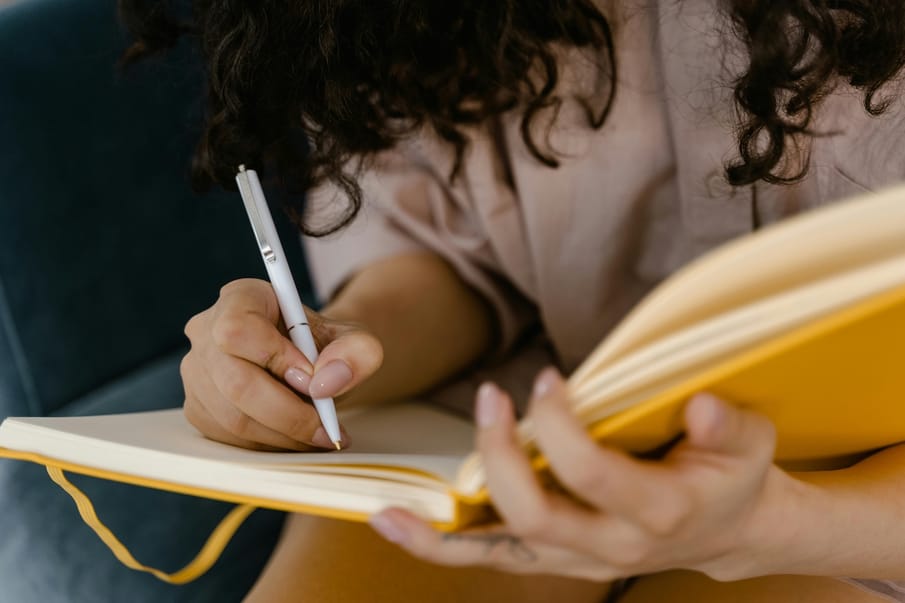Kick off this fantastic habit, and watch your wellbeing flourish
It’s been a difficult day, and I find myself sitting with a floral notebook in front of me. I want to write about how I’m feeling, but I also feel daunted. Although I’ve journaled on and off since my teens, I’ve not stuck to a regular habit, and this is the first time in a while that I’ve tried.
Part of the reason why I picked up the pen was that I’m aware of how it can support our wellbeing. “Journaling can help us process things that have happened to us,” explains counsellor Beth Roberts. “It can help us to spot patterns that we might not notice otherwise. For instance, we might notice we’re prone to making decisions based on others’ opinions, or making sweeping negative statements. It can be liberating and helpful to spot these patterns.
“Journaling can help us find our own voice and learn about ourselves, including our values, beliefs, wants, and needs,” adds Beth. “We also can harness our creativity through journaling, and discover solutions, or ways forward, for things going on in our lives.”
Understand why you want to journal
Despite the benefits, it can be hard to start journaling.
“An important question might be, ‘What do I want to get out of the journaling?’” Beth says. “If you would like to journal to process things that are going on for you, it could be that you would like to write a ‘stream of consciousness’, which is literally starting to write the first thing that comes into your head without any judgement, and carrying on until you have to stop, or there is nothing more to say. Alternatively, if your answer is that you would like to find out more about yourself, you could use more structured journal prompts.”
I’ve found that I turn to journaling when I want to explore something that’s troubling me, but also in times when I’ve wanted to keep notes about what’s going on, from nature walks to days out. It feels like a private space to write things down without judgement.

Find the right setting
When and where you journal is up to you. “I think it’s important, where possible, to journal somewhere you feel safe and comfortable,” says Beth. “This might be your bedroom, study, or garden, but equally I’ve found that train journeys are a great time to do some journaling!”
Think about what time of day works best for you. “For some people, getting up half an hour earlier to journal works well,” Beth says. “The good thing about this is that guards that may be up later in the day are down first thing in the morning, after being asleep. Others like to journal at night, because then they can let go of things before falling to sleep. For someone else, fitting in some journaling before the kids come home from school might work.”
Journaling prompts
Knowing where to begin can be tricky. I find that free writing (writing whatever comes to me, without second-guessing myself) is a good way to get the words flowing. Remember the journal is just for you, so don’t worry about what other people will think.
While it isn’t necessary to follow prompts, they can help you get going, especially if you’re unsure where to start. Beth gives the following suggestions:
Journaling prompts about emotions
How do I feel right now? How does this feel in my body? When was the last time I felt like this? What is it like just to be with this emotion with no judgement? Is it helpful to continue to be with this feeling, or am I being unkind to myself, or dwelling on something I don’t need to dwell on? If it isn’t productive to stay with these emotions, what can I do to shift them? And what has helped in the past?
Journaling prompts about self and identity
What are my core values? What beliefs do I hold from my family, school, or society, and do they hold up to scrutiny? What did I used to love doing but don’t do any more, and why did I stop doing it? What am I proud of myself for?
Managing emotions while journaling
Sometimes, journaling can bring up difficult emotions. While these can be cathartic and good to explore, it’s also important to look after yourself.
“If you know you are going to write about something difficult, it can be a good idea to time the journaling so that you aren’t doing it for too long, or you could take a break and do something completely different,” recommends Beth. Plan to do something nice afterwards, like going for a walk or reading.
“If you do find yourself getting upset while journaling, it’s really important to check in with yourself regarding whether it’s productive or detrimental to continue,” adds Beth. “If you are so upset that you feel panicky or that the tears you are crying are not relieving, it may be a sign that you’re too upset for the journaling to be productive. If you become incredibly distressed, reach out for help from a friend, family member, or helpline. It might also be a sign that therapy could be helpful.”
Be gentle with yourself while you try journaling. I’ve found that journaling can be emotional, but it’s also helped me understand myself, and have an outlet for my thoughts. Whether you want to try it occasionally, or make it a daily ritual, journaling can be a powerful way of exploring who we are.


Comments